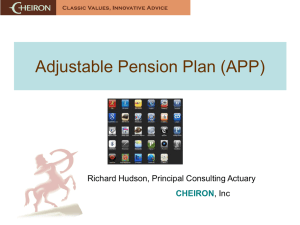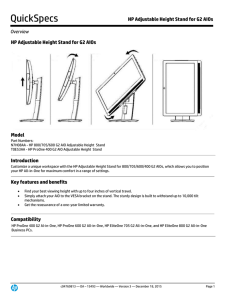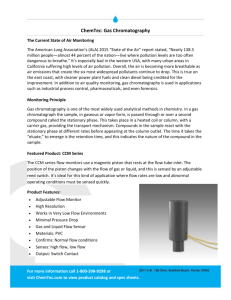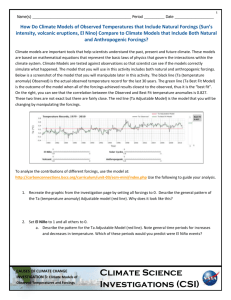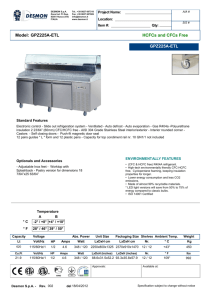Chapter 7 Tools & Techniques of Life Insurance Planning 7
advertisement
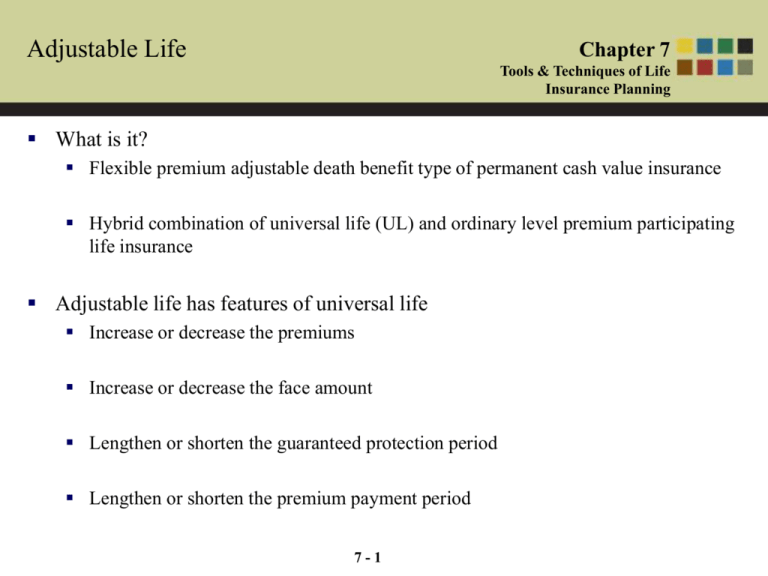
Adjustable Life Chapter 7 Tools & Techniques of Life Insurance Planning What is it? Flexible premium adjustable death benefit type of permanent cash value insurance Hybrid combination of universal life (UL) and ordinary level premium participating life insurance Adjustable life has features of universal life Increase or decrease the premiums Increase or decrease the face amount Lengthen or shorten the guaranteed protection period Lengthen or shorten the premium payment period 7-1 Adjustable Life Chapter 7 Tools & Techniques of Life Insurance Planning Adjustable life has features of universal life Increases in face amount require evidence of insurability Unlike universal life, adjustable life’s policy elements are “bundled” Not explicitly stated in policy statements to the insured Like traditional participating policies, the pure protection and savings elements are not segregated Adjustable life has features of ordinary level premium whole life insurance Minimum interest guarantee Guaranteed maximum mortality charges Cash values 7-2 Adjustable Life Chapter 7 Tools & Techniques of Life Insurance Planning Adjustable life has features of ordinary level premium whole life insurance (cont'd) Nonforfeiture values Policy loan provisions Dividend options A reinstatement period and Settlement options 7-3 Adjustable Life Chapter 7 Tools & Techniques of Life Insurance Planning Adjustable life has features of ordinary level premium whole life insurance (cont'd) Various options or rider available Waiver of premiums Guaranteed purchase of insurability Accidental death benefits and Cost of living adjustments Changes are permitted only at specified intervals and only with advance notice to the insurer Depending on the premium and death benefit level chosen the policy can assume almost any form of term or whole life policy from low premium term to high premium limited payment whole life 7-4 Adjustable Life Chapter 7 Tools & Techniques of Life Insurance Planning Adjustable life has features of ordinary level premium whole life insurance (cont'd) Minimum annual premium is typical equivalent to a premium for a five year term policy Once a policyowner has selected a given plan of insurance, premiums must be paid as scheduled unless the policyowner gives the insurer notice of his desire to change the plan of insurance The plan of insurance defines the length of guarantees at any point in time The cash value is computed based on Premium payments Face amount of coverage The term or duration of coverage 7-5 Adjustable Life Chapter 7 Tools & Techniques of Life Insurance Planning When is the use of this tool indicated? When flexibility is desired, guaranteed protection is needed and the forced savings feature of ordinary level premium whole life insurance is preferred For the family market To adjust to changes in the insured family, income and lifestyle For business life insurance needs Advantages Policyowners discretion in premium payment schedules Element of forced savings creating a level of savings discipline for the client Policyowner can change the amount of coverage or the term of the coverage 7-6 Adjustable Life Chapter 7 Tools & Techniques of Life Insurance Planning Advantages (cont'd) Cost of living adjustment to the face amount is possible Cash values may accumulate income tax deferred or income tax free depending on whether gains are distributed during lifetime or at death Cash values are not subject to the fluctuations in the market value characteristic of longer term municipal bonds or other long term fixed income investments, when market rates change Policy cash values can be borrowed at low net cost 7-7 Adjustable Life Chapter 7 Tools & Techniques of Life Insurance Planning Disadvantages Direct recognition method Smaller dividends allocated to borrowed cash values Lifetime distributions or withdrawals of cash values subject to income tax to the extend of any gain in the policy Surrender of the policy in the first five to ten years might result in considerable loss Interest on policy loans is generally not tax deductible Policy changes made by the policyowner may inadvertently cause the policy to be classified as a modified endowment policy 7-8 Adjustable Life Chapter 7 Tools & Techniques of Life Insurance Planning Tax implications Adjustable life policies are taxed in the same manner as other types of life insurance policies Adjustable life policies are subject to the same income, gift, generation skipping and estate taxation as all other life insurance policies For non-modified endowment policies that meet the definition of life insurance under IRC 7702 The cash surrender values grow income tax deferred The policyowner can take withdrawals (up to their basis in the contract) and then policy loans income tax deferred The death benefit is payable on an income tax free basis 7-9 Adjustable Life Chapter 7 Tools & Techniques of Life Insurance Planning Tax implications (cont'd) Adjustable life policies are taxed in the same manner as other types of life insurance policies Adjustable life policies are subject to the same income, gift, generation skipping and estate taxation as all other life insurance policies For non-modified endowment policies that meet the definition of life insurance under IRC 7702 The cash surrender values grow income tax deferred The policyowner can take withdrawals (up to their basis in the contract) and then policy loans income tax deferred The death benefit is payable on an income tax free basis 7 - 10 Adjustable Life Chapter 7 Tools & Techniques of Life Insurance Planning Tax implications (cont'd) Cost recovery rule (FIFO) Only after the policyowners investment are fully recovered (via withdrawals) are additional amounts received treated as taxable interest or gain in the policy Exception to the cost recovery rule Withdrawals within the first 15 years coupled with a reduction in death benefits If such distributions take place, they will generally be fully or partially taxable to the extent of gain on the policy The taxable amount depends on when the withdrawal is made Within the first five years – Stringent and complex tests apply. Potentially a larger portion or perhaps all of any withdrawal will be taxable if there is gain in the policy Fifth to fifteenth years – A mathematical test applies. frequently only a portion or none of the withdrawal will be taxable 7 - 11 Adjustable Life Chapter 7 Tools & Techniques of Life Insurance Planning Tax implications (cont'd) Caveat: Potential taxation under the MEC rules Distributions under the contract are taxed under the interest first rule rather than the cost recovery rule. In addition, these distributions are subject to a 10% penalty if they occur before the policyowner reaches age 59 1/2, dies or becomes disabled Distributions under the contract means partial surrenders, policy loans, loans secured by the policy, loans used to pay premiums and dividends taken is cash Changes in premiums or death benefits may inadvertently cause an adjustable life policy to become a MEC in basically three ways Increase in premiums push cumulative premiums above amount permitted under the “seven pay test” A reduction in the death benefit causes a re-computation of the seven pay premium, which is applied retroactively 7 - 12 Adjustable Life Chapter 7 Tools & Techniques of Life Insurance Planning Tax implications (cont'd) Changes in premiums or death benefits may inadvertently cause an adjustable life policy to become a MEC in basically three ways (cont'd) A “material” increase in the death benefit at any time triggers a new seven pay test MEC status can be voided if excess premiums are returned to the policyowner within 60 days after the end of the contract year in which the excess occurs Alternatives to adjustable life (AL) Universal life AL provides somewhat less flexibility to adjust premiums and death benefits than UL policies AL policy elements are bundled whereas UL policy elements are “unbundled” AL has more restrictive withdrawal rules than UL 7 - 13 Adjustable Life Chapter 7 Tools & Techniques of Life Insurance Planning Alternatives to adjustable life (AL) (cont'd) Universal life (cont'd) UL offers two death benefit options Option I – level total death benefits and Option II – Level insurance benefit plus cash value AL only offers the traditional level total death benefit AL offers more certainty regarding cash value accumulations than UL AL dividends give the policyowner more options as to how to use or apply the favorable experience of the company that UL policies The requirement to pay the scheduled premiums under the AL policy provides a forced savings feature that is absent with UL 7 - 14 Adjustable Life Chapter 7 Tools & Techniques of Life Insurance Planning Alternatives to adjustable life (AL) (cont'd) Pre-programmed combinations of differing life insurance policies Where and how do I get it? Very few companies continue to develop, distribute and market true adjustable life policies What are the fees and other acquisition costs are involved Most adjustable life policies have no explicit surrender charges Many will pay a terminal dividend when surrendered Costs of administration is higher Expense charges and mortality charges tend to be somewhat higher for these policies 7 - 15 Adjustable Life Chapter 7 Tools & Techniques of Life Insurance Planning How do I select the best of it’s type? Key considerations Policy loan provisions Policy loan interest rate Does the company use a direct recognition method Dividend interest rate current crediting rate Financial stability and strength of the life insurance company What are the adjustment provisions What are the guaranteed insurability options Quality of service provided by the life insurance company 7 - 16
